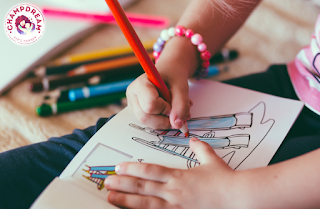Benefits of your kid’s exposure to art and dance
Benefits of your kid’s exposure to art and dance
It's no secret that getting children involved in the performing arts can have significant educational benefits. After all, studies show that youngsters who sing, dance, draw or play their hearts out are four times more likely to be recognized for academic accomplishment than their non-performing peers – and that they also have better cognitive, motor, and social development. But the advantages don't stop there. Getting on stage can benefit your youngster in a variety of unexpected ways.
Children who perform are quick thinkers.
The capacity to remain calm and carry on, whether you're a child or an adult, is what prevents a minor blunder from becoming a large one. Kids learn to improvise when something goes wrong during a performance. As no performance is ever perfect, learning to minimize errors and get back on track is the actual skill. When one of the kids forgets a line, the other youngsters figure out how to cover for him. It's not about never making a mistake; it's about never having your error be seen by the audience. Those are excellent talents to have in the classroom, whether it's giving a presentation in front of a group or being called upon to answer questions.
We at ChampDream continuously search for ways that various extracurricular activities can help youngsters in other aspects of their lives.
Kids win over their anxiety and panic attacks.
Even adults, let's face it, become scared when they have to speak in front of their peers or give a presentation to the boss. Learning how to cope with performance anxiety at a young age provides children an advantage in life's key events. The first step a parent may take is to normalize their child's anxiousness. Before a performance, a lot of kids — and even adults — are apprehensive. It's entirely normal. It won't make the nerves go away, but it will help your youngster realize that feeling nervous is normal.
Allow your youngster to bask in his triumph after the show is finished, then casually comment on how nicely things went. He'll remember this experience for the next time as further proof of his ability to perform well under stress.
Kids become more expressible
One of the most enjoyable aspects of being in a play is the opportunity to transform into someone else for a short period. For a child who finds it difficult to express herself, retreating behind a character and utilizing it as an intermediary to open up can be a huge comfort. It's a wonderfully safe method for youngsters to experiment with different emotions — and take ownership of them — while pretending to be someone else. Some shy youngsters can shine on stage and express themselves in ways they wouldn't dare to do in front of their peers.
Dance can be a great opportunity for youngsters who aren't interested in acting to explore their inner world. Dance teaches children to think uniquely. Instead of assigning a name, you ascribe a movement to the physiological sensation of emotion. It can be a useful tool for children who have difficulty expressing themselves verbally.
Enhances your kid’s self-regard
Nothing like hearing a room full of strangers, laugh at your joke or applaud your double pirouette to make you feel like a celebrity. It's a great sensation to hear the audience clap at the end of a performance. It's quite satisfying to receive instant good responses.
But it's not just about the ego boost from the crowd; any style of performance necessitates collaboration to succeed. The concept of an ensemble is presented to the children. It's not just them who's up there. They are in charge of a broader group that relies on them to fulfill their responsibilities so that they can fulfill theirs.
Nothing like hearing a room full of strangers, laugh at your joke or applaud your double pirouette to make you feel like a celebrity. It's a great sensation to hear the audience clap at the end of a performance. It's quite satisfying to receive instant good responses.
But it's not just about the ego boost from the crowd; any style of performance necessitates collaboration to succeed. The concept of an ensemble is presented to the children. It's not just them who's up there. They are in charge of a broader group that relies on them to fulfill their responsibilities so that they can fulfill theirs.
Final Thoughts
After all, the transferable abilities a child gains through performing may not be nearly as significant as the experience of performing itself.
Your child might never be able to apply her improvisation talents from the school play to a math problem or transfer her teamwork with other dancers into leadership on the playground. But your star kid can be introduced to a new way of thought process and a healthy surrounding. And that, in and of itself, is a triumph to be proud of.
Kids learn crucial notions of discipline by devoting themselves to extracurricular activities. While some children may have a natural ability in one area or another, the truth is that improvement requires continual commitment and practice. Kids gain disciplinary skills that will aid them in many facets of life by committing to sticking with lessons and practicing outside of classrooms and lessons.
Immersing children in the extracurriculars at home through ChampDream's online lessons have clear perks that will benefit them throughout their life.





Comments
Post a Comment